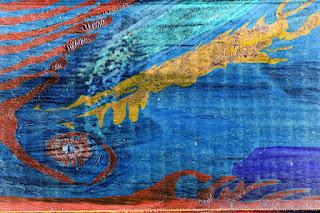A MESSAGE FROM OUR RABBI
I am excited to remind you about our Artist-in
-Residence weekend at the end of October. You
already viewed many of her beautiful pieces
over the course of Rosh Hashanah and Yom
Kippur. Debra Band, our featured artist, will be
commenting on some of her artwork during the
weekend of Oct. 27 - 29. Debra will be
speaking during Friday evening
services, Saturday morning services and
conducting a special workshop on
Sunday morning. The art workshop is a special
program exclusively for Shul members.
The art workshop is geared for teenagers
and adults. This activity is not for young
children. To sign up please send a check for
$36 to the office by Oct. 8. A check must be
received by Oct. 8 so that we have time to
purchase the special materials. PAYMENT
AND RSVPs ARE REQUIRED FOR THIS
ART PROJECT. There is a limit of 20
participants.
A few of Debra’s special areas of interest
include art, mysticism, Bible, and the role of
women in liturgy and Bible. Debra works
extensively with the Women’s League of
Conservative Judaism. She travels frequently to
address Women’s League events as well as
other groups including inter-religious dialogue
organizations. Involved in Medical ethics
review, she is a lay member of the
Neurosciences Institutional Review Board of
the National Institutes of Health in Bethesda,
MD.
I am very pleased that we are able to invite
the Temple membership to enjoy Debra’s
special presentations during Friday and
Saturday services. As a community we must
come together in learning, recreation and
worship. Please encourage your Temple friends
to join you during Friday and Saturday services
for the weekend of October 27 - 29, 2017. We
all grow from shared Jewish experience.
Debra Band has two books which she will
be selling. Both are stunningly beautiful:
Kabbalat Shabbat, regularly priced at $50, will
be $40. Arise usually priced at $40 will be $35.
These books are beautiful presentations of her
artwork and incorporate eye-opening comments
on prayer and Jewish women. What a great
Chanukah gift idea!
I hope everyone takes part in this rare
opportunity to grow artistically and Jewishly.
Please feel free to invite any and all Jewish
friends to the Friday evening and Saturday
morning programs. Please reserve your place
and that of a Shul friend in the art workshop. I
suggest you visit her website. You will be
entranced by her artwork’s beauty:
http://dbandart.com/
I look forward to seeing you during the
weekend!
Torah Tidbits and Haftarah Highlights
By Rabbi Steven Silberman
(All page numbers refer to Etz Hayim)
Oct. 7 - Shabbat Sukkot - pp. 724 - 730
This passage is read on all three major holidays
(Passover, Shavuot and Sukkot). What is the
reason found in Torah for us to have a sukkah?
See p.730.
Haftarat Sukkot - pp. 1253 – 1255
Prophet Zechariah lives at a troubled time in
Israel when many ancient Jews are forgetting
basic Judaism. He teaches the importance of
living in a sukkah for the holiday and he
stresses that all peoples will embrace
monotheism. For Zechariah a sukkah
symbolizes a peaceful and harmonious
existence. He teaches that nations which do not
embrace this Israelite value will suffer.
Oct 14 - Parshat Beresheet - pp. 13 - 29
Famously, the serpent is described as being a
perennial enemy of people. Why do you think
God placed the first couple in a garden in the
first place?
Haftarat Beresheet - pp. 36 - 40
Why does Isaiah bring ‘singing’ into the world?
What is he trying to accomplish? Look at verse
10 on page 37.
Oct. 21 - Parshat Noach - pp. 48 - 58
Noach is chosen to be the father of humanity
because he is a righteous man. He is described
as pure. After the flood God commands Noach
to refrain from one behavior. Which command
does God issue to Noach? Why? See p. 50
verses 4-5.
Haftarat Noach - pp. 65 – 68
Isaiah lives many centuries after Noach. He
employs a poetic phrase that God has made a
promise to his fellow Israelites in his own time
(2,700 years ago) and this promise is as
enduring as the vow God made to Noach. What
is Isaiah trying to say? Look at p. 67 and read
verses 11-14.
Oct. 28 -Parshat Lech Lecha - pp. 77 – 85
A battle between two groups of kings spills
beyond the immediate battle line and
collaterally affects the people living in Sodom.
Abram sticks his neck out to help strangers.
Why does Torah include this passage?
Haftarat Lech Lecha - pp. 95 - 98
A beautiful text from Isaiah names Abraham
and Jacob as ‘friends’ of God. Why is this
Haftarah read in connection with this Torah
reading? How do you feel when you hear Jacob
and Abraham called ‘friends’ of God?


